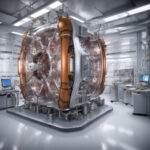AI Revolutionizes Particle Physics: CERN’s New Tools Promise Major Discoveries
In the realm of particle physics, the quest for understanding the fundamental building blocks of the universe has been an ongoing endeavor for centuries. From the discovery of the electron to the identification of the Higgs boson, scientists have made remarkable strides in unraveling the mysteries of the cosmos. Now, with the advent of artificial intelligence (AI), a new chapter is set to unfold in the annals of particle physics, with CERN leading the charge.
CERN, the European Organization for Nuclear Research, is renowned for its cutting-edge research in particle physics. Home to the Large Hadron Collider (LHC), the world’s most powerful particle accelerator, CERN is at the forefront of scientific exploration. Recently, CERN has announced the development of new AI tools that are poised to revolutionize the field of particle physics, promising major discoveries and breakthroughs.
The integration of AI into particle physics research holds immense potential for accelerating the pace of discovery. By leveraging advanced machine learning algorithms, scientists can analyze vast amounts of data more efficiently and uncover hidden patterns that may elude traditional methods. This transformative technology enables researchers to sift through petabytes of data generated by experiments at the LHC with unprecedented speed and precision.
One of the key areas where AI is poised to make a significant impact is in the detection of rare particles and elusive phenomena. Particle physics experiments often involve the collision of particles at high energies, resulting in a myriad of subatomic particles being produced. Identifying rare particles or new physics phenomena amidst this sea of data is akin to finding a needle in a haystack. However, AI algorithms excel at recognizing subtle patterns and anomalies, making them invaluable tools for particle physicists.
Moreover, AI can enhance the predictive capabilities of simulations, enabling researchers to model complex interactions with greater accuracy. By training AI models on existing data, scientists can develop more realistic simulations of particle collisions and their outcomes. This not only helps refine theoretical models but also guides experimental design, maximizing the scientific yield of each particle physics experiment.
Furthermore, AI can facilitate the automation of data analysis processes, freeing up researchers to focus on higher-level tasks. By delegating routine tasks such as data cleaning, event reconstruction, and background subtraction to AI systems, scientists can devote more time to hypothesis testing, model refinement, and theoretical interpretation. This streamlined workflow not only accelerates the pace of research but also fosters a more productive and dynamic research environment.
The implications of AI in particle physics extend beyond the realm of scientific discovery. By fostering interdisciplinary collaborations between physicists, computer scientists, and data analysts, AI promotes knowledge exchange and innovation across diverse fields. The synergy between AI and particle physics paves the way for novel methodologies, tools, and approaches that can benefit not only fundamental research but also broader societal challenges.
As CERN embarks on this AI-driven transformation of particle physics, the scientific community eagerly anticipates the major discoveries and breakthroughs that lie ahead. By harnessing the power of AI to unravel the mysteries of the universe, CERN is poised to redefine our understanding of the cosmos and push the boundaries of human knowledge to new frontiers.
In conclusion, the convergence of AI and particle physics represents a paradigm shift in scientific exploration, propelling us towards a future of unprecedented discovery and innovation. As CERN’s new AI tools promise major physics discoveries, the stage is set for a new era of exploration and understanding in the realm of particle physics.
AI, ParticlePhysics, CERN, ScientificDiscovery, Innovation












